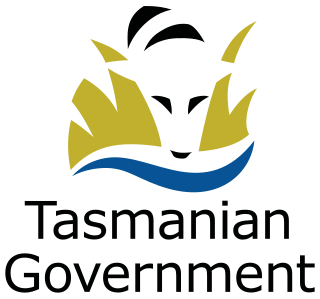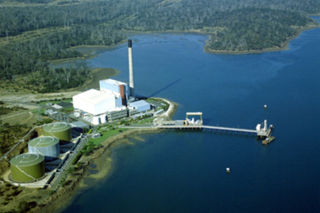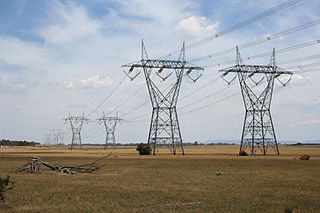New Zealand's electricity market (NZEM) is regulated by the Electricity Industry Participation Code administered by the Electricity Authority (EA). The Authority was established in November 2010 to replace the Electricity Commission.
Meridian Energy Limited is a New Zealand electricity generator and retailer. The company generates the largest proportion of New Zealand's electricity, generating 35 percent of the country's electricity in the year ending December 2014, and is the fourth largest retailer, with 14 percent of market share in terms of customers as of December 2015.

Hydro Tasmania, known for most of its history as the Hydro-Electric Commission (HEC) or The Hydro, is the trading name of the Hydro-Electric Corporation, a Tasmanian Government business enterprise which is the predominant electricity generator in the state of Tasmania, Australia. The Hydro was originally oriented towards hydro-electricity, due to Tasmania's dramatic topography and relatively high rainfall in the central and western parts of the state. Today Hydro Tasmania operates thirty hydro-electric and one gas power station, and is a joint owner in three wind farms.

Transend Networks Pty Ltd was a Tasmanian government-owned business which operated between 1998 and 2014 as the electricity transmission network provider for Tasmania, Australia. It was formed by the disaggregation of the Hydro-Electric Commission, and ceased operation when it was merged on 1 July 2014 with the distribution division of Aurora Energy to form the combined network business TasNetworks.

The Government of Tasmania, also referred to as the Tasmanian Government, is the executive authority of the state of Tasmania, Australia. The leader of the party or coalition with the confidence of the Tasmanian House of Assembly, the lower house of the Parliament of Tasmania, is invited by the Governor of Tasmania to form the Government of Tasmania. The head of the Government is the Premier of Tasmania.
The National Electricity Market (NEM) is an arrangement in Australia's electricity sector for the connection of the synchronous electricity transmission grids of the eastern and southern Australia states and territories to create a cross-state wholesale electricity market. The Australian Energy Market Commission develops and maintains the Australian National Electricity Rules (NER), which have the force of law in the states and territories participating in NEM. The Rules are enforced by the Australian Energy Regulator. The day-to-day management of NEM is performed by the Australian Energy Market Operator.
Snowy Hydro Limited is an electricity generation and retailing company in Australia that owns, manages, and maintains the Snowy Mountains Hydro-electric Scheme which consists of nine hydro-electric power stations and sixteen large dams connected by 145 kilometres (90 mi) of tunnels and 80 kilometres (50 mi) of aqueducts located mainly in the Kosciuszko National Park. Snowy Hydro also owns and operates two gas-fired power stations in Victoria and one in New South Wales, three diesel power stations in South Australia, and owns two electricity retailing businesses.

Trustpower Limited is a New Zealand electricity generation and electricity retailing company, listed on the New Zealand stock exchange.

Ergon Energy is a subsidiary company of Energy Queensland Limited (EQL) a Government owned corporation owned by the Government of Queensland. It distributes electricity to around 738,000 customers across Queensland, excluding South East Queensland through a distribution network regulated by the Australian Energy Regulator (AER) who set the prices that Ergon is allowed to charge for distribution.

Origin is an Australian listed public energy company with headquarters in Sydney. It is an Australian Stock Exchange publicly listed company.

ENMAX Corporation (ENMAX) is a vertically integrated utility that generates and distributes electricity, natural gas, renewable energy, and value-added services to customers in Alberta, Canada.

Synergy is a corporation owned by the Government of Western Australia. Synergy, Verve Energy, Horizon Power and Western Power were created in 2006 as a result of the breakup (disaggregation) of Western Power Corporation. With effect from 1 January 2014 the retailer (Synergy) merged with the state-owned generation business. That new company is also called Synergy. The corporation's official legal name is the "Electricity Generation and Retail Corporation". Synergy is Western Australia’s largest energy retailer and generator with more than one million industrial, commercial and residential customers, generating total annual revenue of more than $3.2 billion.

The Bell Bay Power Station was a power station located in Bell Bay, on the Tamar River, Tasmania, Australia, adjacent to the Tamar Valley Power Station, with which it was often confused. It was commissioned between 1971 and 1974 as an oil fired thermal power station, and was converted to natural gas in 2003, after the commissioning of the Tasmanian Gas Pipeline, a submarine gas pipeline which transports natural gas from Longford, Victoria, under Bass Strait, to Bell Bay, Tasmania. As the power station's primary role was to provide system security in the event of drought for Tasmania's predominantly hydro-electric based generation system it only was rarely called on to operate, resulting in intervals of five to eight years between periods of significant use. After the commissioning of Basslink in 2006, the power station was decommissioned in 2009.

Contact Energy Limited is a New Zealand electricity generator, natural gas wholesaler and electricity, natural gas, broadband and LPG retailer.

Energy in Victoria, Australia is generated using a number of fuels or technologies, including coal, natural gas and renewable energy sources. Brown coal is the main primary energy source for the generation of electricity in the state, accounting for about 85% of electricity generation in 2008. Brown coal is also one of the largest contributors to Australia's total domestic greenhouse gas emissions and a source of controversy for the country. Australia is one of the highest polluters of greenhouse gas per capita in the world.
Tamar Valley Power Station is a $230 million natural gas-fired power station located in Bell Bay in the Tamar Valley, Tasmania. It is owned by Hydro Tasmania, and is immediately adjacent to the decommissioned Bell Bay Power Station, which is also owned by Hydro Tasmania.

Lumo Energy, as is Red Energy, a trading name of Snowy Hydro, is an Australian energy retailer operating in Victoria and South Australia. Lumo Energy has been wholly owned by Snowy Hydro since 2014. The business offers electricity and gas packages in Victoria and South Australia. As at October 2017, the business has almost 500,000 customers and a workforce of just under 500 people.

Tasmanian Networks Pty Limited, trading as TasNetworks, is a Tasmanian Government State owned company that is responsible for electricity transmission and distribution throughout Tasmania. It also owns and operates a telecommunications network throughout the state.
The 2016 Tasmanian energy crisis was an ongoing energy storage situation in the state of Tasmania, Australia in 2016. Two years of high volumes of energy exported to Victoria via the Basslink HVDC cable, followed by low rainfall, and a fault which rendered the cable inoperable, resulted in record low storage levels in Tasmania's hydro-electric system. This resulted in a number of contingency plans to be enacted by Hydro Tasmania and the Hodgman Government.
Electric Kiwi is an independent online New Zealand electricity retailer.













